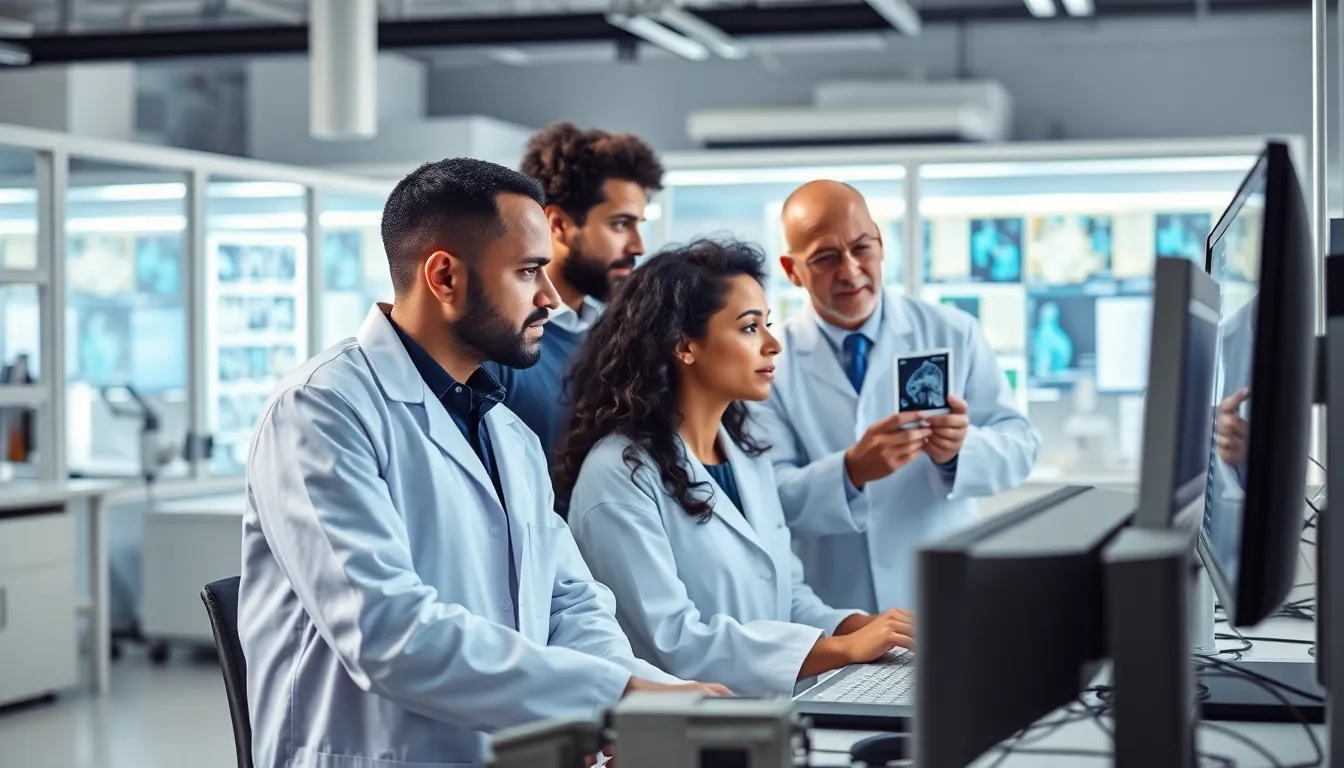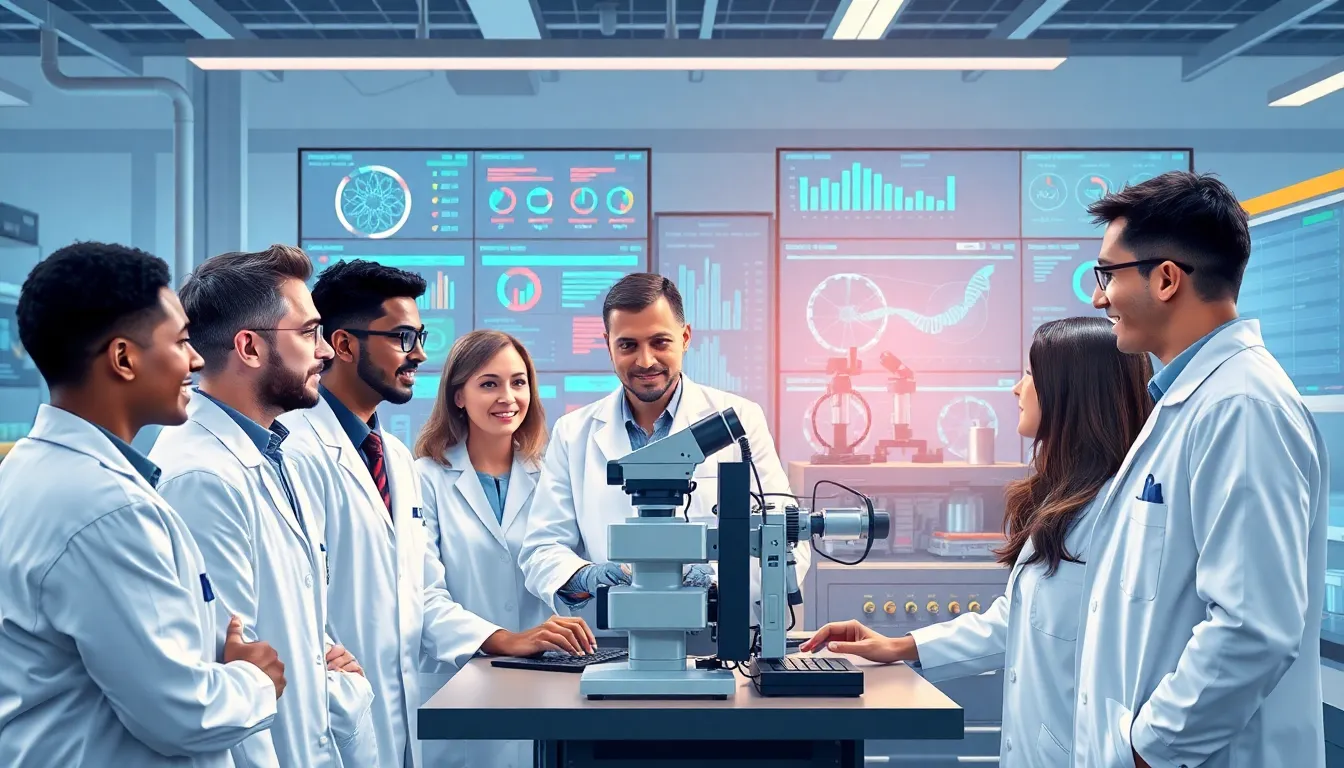Table of Contents
ToggleIn a world where science fiction often feels like reality, technology trends in life sciences are leading the charge. From AI-powered diagnostics that could give Sherlock Holmes a run for his money to gene editing that sounds like it’s straight out of a superhero movie, the life sciences sector is buzzing with innovation. It’s not just about saving lives; it’s about making life a whole lot more interesting.
Overview of Technology Trends in Life Sciences
Advancements in life sciences technology drive significant improvements in healthcare and research. Artificial intelligence plays a pivotal role in diagnostics, enabling faster and more accurate disease detection. AI algorithms analyze medical data to identify patterns that humans may overlook, ultimately improving patient outcomes.
Gene editing, particularly through CRISPR technology, revolutionizes genetic research. This method allows precise alterations to DNA, paving the way for potential cures for genetic disorders. Researchers harness these capabilities to modify genes in various organisms, enhancing biological understanding and treatment possibilities.
Telemedicine gains traction as healthcare becomes more accessible. Patients enjoy the convenience of virtual consultations, receiving timely advice without the need for in-person visits. Technology enables healthcare professionals to monitor patients remotely, ensuring continuous care, especially in underserved areas.
Wearable devices also contribute to advancements in patient health monitoring. These gadgets track vital signs, activity levels, and other health metrics in real time. Data from wearables provide insights that help healthcare providers personalize treatment plans.
Blockchain technology finds application in life sciences by securing patient data and streamlining supply chains. Transparency increases as blockchain records every transaction, ensuring data integrity and traceability. Therefore, stakeholders benefit from enhanced collaboration and security.
Robotics continues to play a critical role in laboratories and surgical settings. Automated systems perform repetitive tasks efficiently, allowing researchers and surgeons to focus on complex decisions. Robotics enhance precision in surgeries, promoting better surgical outcomes.
Emerging technology trends converge to create a holistic approach to life sciences. These innovations not only improve diagnostics and treatments but also fundamentally alter how healthcare operates, making it more efficient and patient-centered.
Emerging Technologies

Emerging technologies are continually reshaping the life sciences landscape. Innovations enhance healthcare delivery and research efficiency.
Artificial Intelligence in Life Sciences
Artificial intelligence (AI) significantly impacts diagnostics and drug discovery. Algorithms analyze vast datasets, detecting patterns that humans may overlook. Fast and accurate analyses of medical images and genetic sequences lead to quicker diagnoses. AI models predict how patients respond to treatments, optimizing personalized care plans. Innovations in natural language processing streamline clinical trials by automating data collection and report generation. AI applications not only boost productivity in laboratories but also improve patient outcomes by facilitating early disease detection.
Blockchain Applications in Healthcare
Blockchain technology offers secure and transparent data management in healthcare. Patient records stored on blockchain are immutable, reducing the risk of fraud. Efficient sharing of medical data enhances interoperability across healthcare systems. Supply chain integrity improves as blockchain tracks pharmaceuticals from manufacturers to consumers. By ensuring data integrity, this technology builds trust among patients and providers alike. Streamlined processes lead to reduced costs and improved service delivery, making blockchain a game-changer in the life sciences sector.
Innovative Research Techniques
Innovative research techniques continue to shape life sciences, facilitating groundbreaking discoveries and enhanced treatments. These advancements span various domains, each contributing uniquely to healthcare evolution.
CRISPR and Gene Editing
CRISPR technology revolutionizes genetic editing, enabling precise modifications at the DNA level. Researchers utilize this tool to target specific genes linked to hereditary diseases and other health conditions. Extensive studies demonstrate CRISPR’s potential in developing therapies for genetic disorders like sickle cell anemia and cystic fibrosis. Its versatility allows for rapid advancements in agricultural biotechnology, further enhancing food security. Moreover, scientists investigate the ethical implications of gene editing, ensuring responsible use alongside innovative applications.
Personalized Medicine Approaches
Personalized medicine emphasizes tailored treatments based on individual genetic profiles. Clinicians analyze unique patient data, including genetic markers and lifestyle factors, to design effective treatment plans. This approach results in higher success rates and fewer side effects compared to traditional methods. Techniques like pharmacogenomics provide insights into how patients metabolize medications, guiding optimal drug choices. Organizations increasingly incorporate these strategies into their systems, promoting patient-centric healthcare models that improve outcomes. Through ongoing research, personalized medicine evolves, addressing challenges and paving the way for future advancements.
Impact on Drug Development
Technology trends in life sciences significantly reshape drug development processes, encouraging efficiency and accuracy in research efforts.
Accelerated Clinical Trials
Clinical trials experience acceleration due to advanced technologies. Artificial intelligence analyzes vast datasets to identify suitable candidates, reducing recruitment time. Innovative virtual platforms enable remote monitoring and data collection, enhancing patient engagement. Automation streamlines documentation and reporting, minimizing administrative delays. Furthermore, predictive analytics optimize trial designs, allowing for more effective protocols. These innovations shorten the time from research to market, freeing resources for further research endeavors.
Real-World Evidence and Data Analytics
Real-world evidence offers essential insights into drug effectiveness and safety. Collecting data from electronic health records, wearable devices, and patient registries enhances understanding of treatment outcomes. Analytics tools process this information, allowing researchers to identify trends and patterns. By harnessing patient experiences, life sciences companies develop personalized therapies that increase success rates. This data-driven approach fosters collaboration among stakeholders, driving informed decisions throughout the drug development pipeline.
Challenges and Ethical Considerations
Technology advancements in life sciences present significant challenges and ethical considerations. AI’s involvement in diagnostics and drug discovery raises concerns over data privacy and security. Patients’ sensitive information requires stringent protections to prevent breaches. Precision medicine, while beneficial, creates questions about genetic data ownership and consent.
Gene editing techniques like CRISPR introduce ethical dilemmas regarding potential misuse. Editing DNA can foster improvements in health but may also lead to unintended consequences. The possibility of designer babies raises societal and moral debates about the extent of genetic manipulation. Regulatory frameworks must evolve to address these issues effectively.
Telemedicine boosts healthcare accessibility but poses challenges in maintaining quality of care. Virtual consultations may compromise the patient-provider relationship and limit thorough evaluations. Ensuring the reliability of remote monitoring devices and their data accuracy is crucial for patient safety.
Wearables and data analytics provide valuable health insights, which brings up concerns about data interpretation. Misinterpretation of data can lead to incorrect health decisions, potentially harming patients. Ethical standards must guide the use of health data to avoid detrimental effects on individuals and populations.
Blockchain technology offers solutions for data security but introduces complexities in patient consent management. Patients may struggle to understand how their data is stored and used. Collaborations among stakeholders require transparency in data handling processes to build trust.
Robotics enhances efficiency in laboratories but raises workforce implications. Increased automation may lead to job displacement in certain roles. Addressing potential inequities in employment will be essential as technology continues to advance.
These challenges and ethical considerations play a crucial role in shaping the future of life sciences. Balancing innovation with ethical standards ensures that advancements benefit society as a whole.
The future of life sciences is undeniably intertwined with technology. As advancements continue to emerge they promise to enhance healthcare delivery and research capabilities. The integration of AI gene editing telemedicine and blockchain is setting the stage for more personalized and efficient medical solutions.
However the journey isn’t without its challenges. Ethical considerations data privacy and the implications of automation must be addressed to ensure that these innovations serve the greater good. As the industry evolves staying informed and adaptable will be crucial for healthcare professionals researchers and patients alike. Embracing these trends while prioritizing ethical standards will ultimately lead to a more equitable and effective healthcare landscape.




